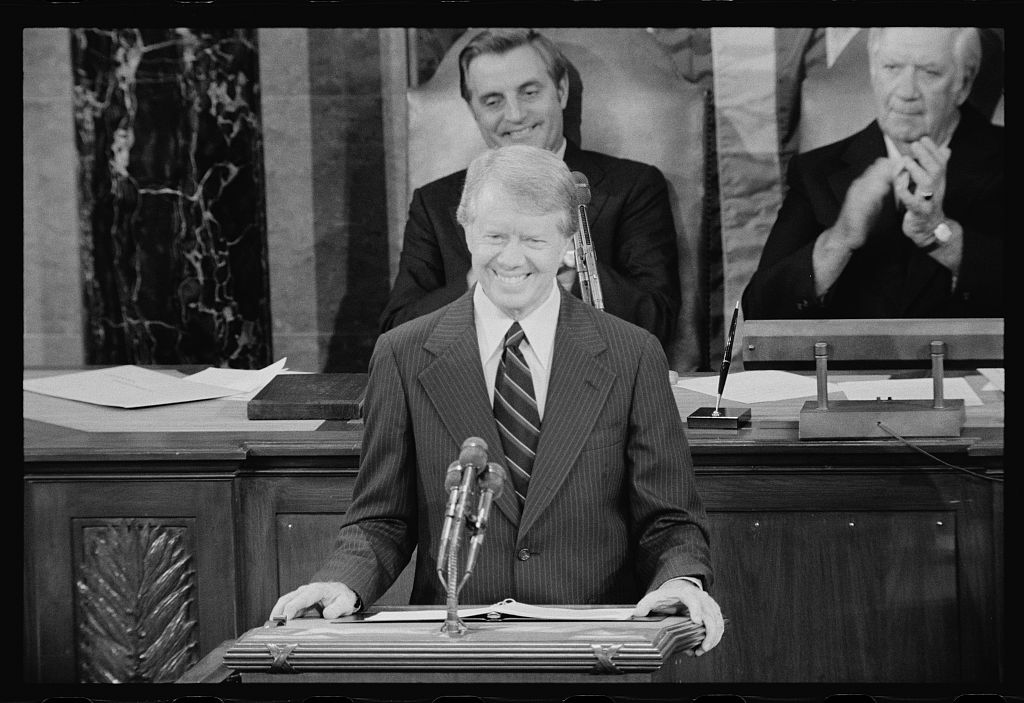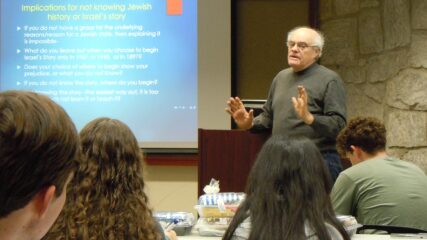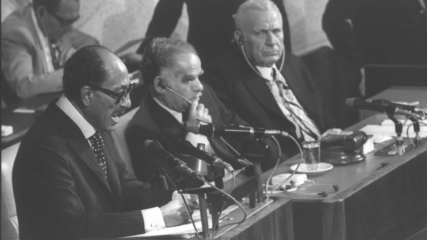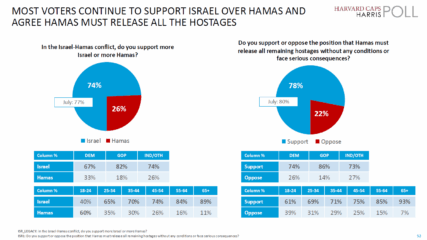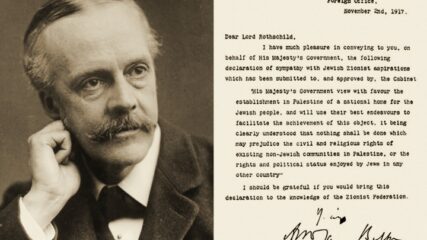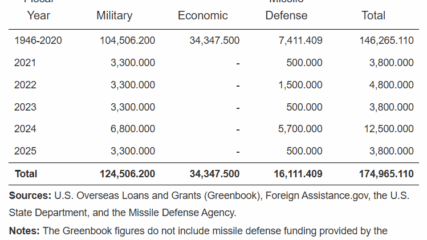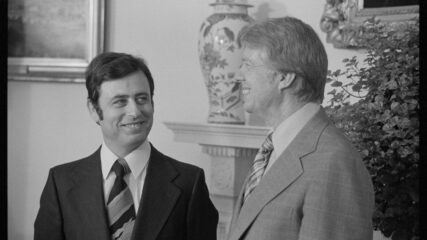September 16, 1978
Source: Israel State Archives/Box/A4314/1. Notes taken by Simcha Dinitz.
Discussion at Camp David, Maryland, on the use of U.N. Security Council Resolution 242
Top Secret
Participants: Vance, Mondale, Brzezinski, Lewis, Dayan, Barak and Dinitz
Barak: Informs about the changes that were proposed last night and that we agreed upon.
Vance: Relates to their version about Clause C in the paper that deals with the West Bank.
Dayan: Explains that there should be two types of negotiations: One that is conducted by the group that discusses self-rule; and the second with Jordan on a peace treaty that has to be based on 242. Under no circumstances should 242 and all of its clauses be related to an agreement that will be achieved with the Palestinians, Jordan, Egypt and Israel. The F.M. agrees that it will be possible to later include the agreement on the first subject inside the peace treaty that we’ll sign with Jordan. But the discussion of the first group should not be based on 242, borders, security etc.
Barak: Adds that many of the issues can be integrated later on to an agreement with Jordan. Therefore, there isn’t a complete separation, and the negotiations can be handled simultaneously and he sees no influence of one on the other. There will be an interaction and even the timing can be synchronized.
Vance: Said that they have a different definition of the final status than Israel does. The U.S. does not think that we can arrive at the final status with reference only to people and borders.
Barak: There is a general reference in 242 to the overall issues and it covers everything, but 242 should not be included specifically in the clause.
Vance: Said that he recognizes a fundamental problem, in that 242 should be included in the discussion of the status, and here is where we have different views. He added that they tried to meet our demands by inserting through talks.
Barak: Asked: What are the principles of 242? Why do we have to relate once again to withdrawal? After all we already had a withdrawal.
Vance: Said that the answer is that there is a problem with the final withdrawal or further withdrawal.
Barak: Said that there is here a pre-judgment that suggests that we ought to decide on borders.
Vance: He said that when they entered the term security needs and decided that there will be secured and recognized boundaries they did so in order to provide us with the necessary flexibility during the talks about the future borders. He emphasized that they did not use the words minor modifications.
Barak: Argued that the Secretary did not respond to the major point that he raised: The moment he said “borders” he determined that this is a state that has its own borders.
Vance: Said that maybe the term border is better than boundaries.
Saunders: Suggested the option of using lines.
Barak: Said that this is also a pre-judgment.
Vance: Suggests the term borderlines and that it is necessary to examine and choose the proper term.
Barak: Borders and borderlines are almost the same thing. We have a strong case in that 242 does not relate to the Palestinian problem, but to the refugee problem. Even El-Baz would say that 242 does not serve as a sufficient base for the solution of the Palestinian problem. In the paper in front of us there is a base for the solution of the problem, but if you adhere to 242 than you do not have one. The Palestinian problem should be resolved not on the basis of 242, and all options should be left open.
Saunders: Said that it should be consistent with 242.
Barak: Said that it is true but it needs to be defined as such.
Vance: Said that it is necessary to relate to the question of withdrawal because it belongs to 242.
Barak: Suggested that in order to conduct to two negotiations simultaneously, we may start them both after three years.
Vance: Emphasized that he is not ready to exclude 242 from the first group (the future of the West Bank) and that is why he suggests returning to the version of joint negotiations on the two problems.
Barak: Said that the problem is not whether there will be one committee or two but rather what should be the normative framework of the discussion. Once there is a talk about peace treaty we decide that it is a priori between states and decide before hand that there will be a state.
Brzezinski: Suggested that the negotiations will be a part of 242.
Vance: Commented that he does not think that it is possible to ignore the fact that 242 should be a part of it.
Barak: Reminded that our proposal is based on a working paper that separates the two types of the negotiations.
Vance: Said that this was the principle that we agreed upon when we considered going to Geneva and we did not want to include Syria. Even now we make a distinction between an agreement and treaty.
(Here Vance began writing a few versions with his pencil.)After consultation among themselves the Americans read:
When the self-governing authority is established, during the transitional period, negotiations will take place to determine the final status of the West Bank and Gaza and its relationship with the neighbors. During the afore-mentioned period negotiations will take place to conclude a peace treaty between Israel and Jordan. The negotiations will be based on all the provisions and principles of Resolution 242.
(It was concluded that we shall return and discuss this clause.)

